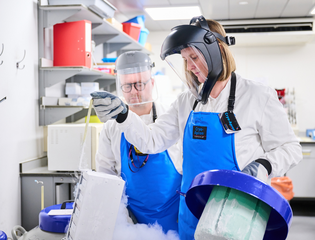The menopause usually happens naturally between the ages of 45-55 when levels of oestrogen gradually decline and a woman’s periods stop.
If you have risk-reducing surgery to remove your ovaries, these hormonal changes will happen as soon as you have the surgery, rather than gradually. This is known as surgical menopause. Surgical menopause can seem overwhelming as symptoms are more sudden and can feel more severe than with the natural menopause.
Since the guidelines for risk-reducing surgery are to have your ovaries removed between 35-40 for BRCA1, and for BRCA2 and Lynch to have this surgery between 40-45, you will not only go through the menopause more suddenly, but also earlier in life than with a natural menopause. This has implications for your ongoing, future health, not only for immediate symptoms you may experience.
When discussing your surgery options with your medical team, make sure to discuss how best to manage surgical menopause. You can be referred to a menopause specialist, who may be part of a gynaecology or sexual health team, who will be well placed to advise you on your options and how to best cope with any symptoms you have. Click here to find a menopause specialist in your area.
Symptoms of surgical menopause
Some women experience symptoms more intensely after surgical menopause because of the abrupt onset of hormonal changes. Some women will not experience any of these symptoms, some will experience a few, and some will experience all.
- Hot flushes: a typical hot flush lasts between 30 secs and 10 minutes, and feels like sudden feelings of heat, mostly on your face, neck and chest. Your skin might redden, like you are blushing and you may sweat, so may feel chilled afterward. Hot flushes can vary from occasional to very frequent, day and night. They don’t usually last long, but can leave you feeling tired, anxious, frustrated, sweaty, hot, and they can be accompanied by palpitations.
- Emotional symptoms can include irritability, poor concentration, poor memory, and “mental fogginess”. Sometimes, addressing the hot flushes can improve these symptoms because it means you can get more sleep.
- Vaginal atrophy (thinning of the vaginal wall) and dryness can lead to irritation, itchiness, burning and painful sex, as well as recurring urinary tract infections.
- All these changes can result in reduced libido (sex drive)
- Bladder symptoms can include increased frequency and urgency. These symptoms tend to worsen with time, so seek help sooner rather than later.
- Other bodily changes can include brittle nails, thinning of the skin, hair loss and aches and pains.
- The reduced levels of oestrogen can mean that women who go through early menopause have an increased risk of osteoporosis and cardiovascular disease.
Managing your menopause symptoms
Hormone Replacement Therapy (HRT)
The Royal College of Obstetricians and Gynaecologists advise that women with a BRCA or Lynch syndrome mutation who have not had breast cancer should take HRT until the natural age of menopause (51). This is to counteract the impact of early surgical menopause on your bone and heart health. This is also the current guidance by NICE in England/Wales and SIGN in Scotland.
For women who have had breast cancer, the use of HRT is not usually recommended, but discuss with your medical team as this may vary depending on the type of breast cancer you’ve had. If you have had oestrogen receptor negative breast cancer and you are struggling with menopause symptoms, you can discuss your individual risks with your specialist.
The risk reduction benefit of having your ovaries removed before the menopause is not thought to be affected by giving HRT3.
Hormone replacement can be used after oophorectomy until the time of natural menopause without losing the benefits of any breast cancer risk reducing surgery a BRCA+ woman has had[3].
HRT is thought to:
Prevent loss of bone strength
Maintain a healthy heart
Prevent cognitive decline in later life
Read our informative booklet on HRT for women with a high risk of cancer to find out more.
After a surgical menopause, HRT is given via tablets, patches and gels. Women who still have a uterus (womb) will need two hormones, oestrogen and progestogen, whereas women who have also had a hysterectomy (had their womb removed) will only need oestrogen.
Vaginal oestrogen is given to treat vaginal changes after a surgical menopause and can be used alone or alongside conventional HRT. Vaginal oestrogen will not help other menopausal symptoms but is associated with fewer side effects and risks. It can be given via creams, vaginal tables or vaginal rings, all of which are effective at reducing vaginal dryness and sexual discomfort.
There have been many research studies into the safety of HRT. It is important to discuss your personal risks with someone who specialises in dealing with women who are experiencing the menopause so they can explain in detail what your personal risks and benefits are.
We do think HRT increases the risk of breast and ovarian cancers, but overall these risks are thought to be low and need to be balanced with the benefits.
To give an example, for every 1,000 women using HRT for five years, there will be just one additional ovarian cancer diagnosis.
It is thought that overall, reducing HRT use could cut 1400 cases of cancer a year, whereas keeping a healthy weight could cut 13,200 cases a year.
You may not experience any at all, but side effects of HRT may occur in some women and can include breast tenderness, headaches and leg cramps. They usually improve with time. Occasionally a change in dose or type of oestrogen will be necessary and your doctor will work with you to find the most appropriate dose and type. You may need to try a couple before finding one that suits you.
If you choose not to use HRT or have a medical reason not to, other medications can be prescribed. Citalopram, paroxetine and venlafaxine are classed as antidepressant medicines but they have been found to help menopausal flushes and sweats when used at low doses. Clonidine is a blood pressure medicine that may help flushes. If you experience bone density loss later in life, you may be prescribed drugs to treat osteoporosis.
Cognitive behavioural therapy (CBT) has been proven to be a safe and effective treatment for women who experience menopausal symptoms such as hot flushes and night sweats with additional benefits to mood, sleep and quality of life. The CBT Register UK allows you to search for a therapist in your area or you can ask your GP for a referral.
There are lots of herbal and dietary supplements aimed at helping with the menopause. The evidence for these is inconsistent so you may wish to ask a pharmacist for advice as they can interfere with other medicines; these remedies may also contain oestrogen.
You can find out more about these alternatives on the NHS website.
A surgical menopause changes your hormone levels which can affect how you feel. This is on top of the emotions that you may already be feeling relating to your experiences of genetic testing and surgery.
You may feel:
- Too young to be going through the menopause
- Less feminine
- Worried about the future and your health
If this sounds familiar you may benefit from talking to your family and friends about how your feelings are affecting you and your relationships. It may also help to speak to a counsellor or with other women who have experienced the same.
After a surgical menopause, you will be advised to take measures to ensure that you stay healthy in the years ahead. This will include protecting your bones from osteoporosis and maintaining a healthy heart.
Early menopause can increase the likelihood of developing osteoporosis or loss in bone density which, for some women, may lead to an increased risk of fractures. You should be offered a DEXA scan to assess the density or strength of your bones, which will help to predict your future risk of fracture.
Download our informative booklet on HRT produced with Menopause specialist Dr Louise Newson to find out more about the options open to women with a high risk or history of cancer.
Where to go for advice and support
- Menopause Matters is an independent website providing up-to-date, accurate information about the menopause, menopausal symptoms and treatment options.
- Henpicked also contains lots of information about the menopause, including early and surgically-induced menopause.
- The Daisy Network has lots of useful information for younger women who are having issues with early menopause.
You can also read Laura Moses’s experience of going through the menopause as a young woman.

